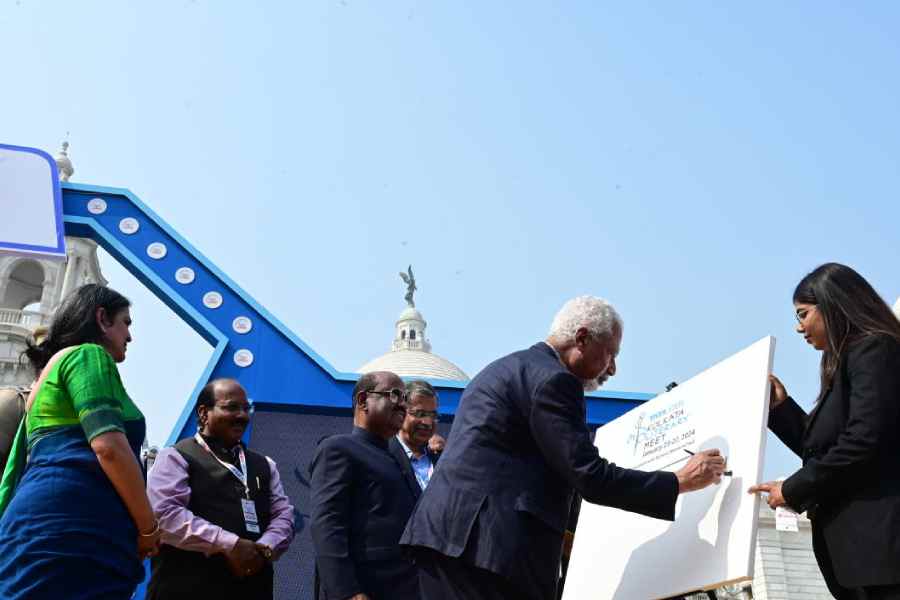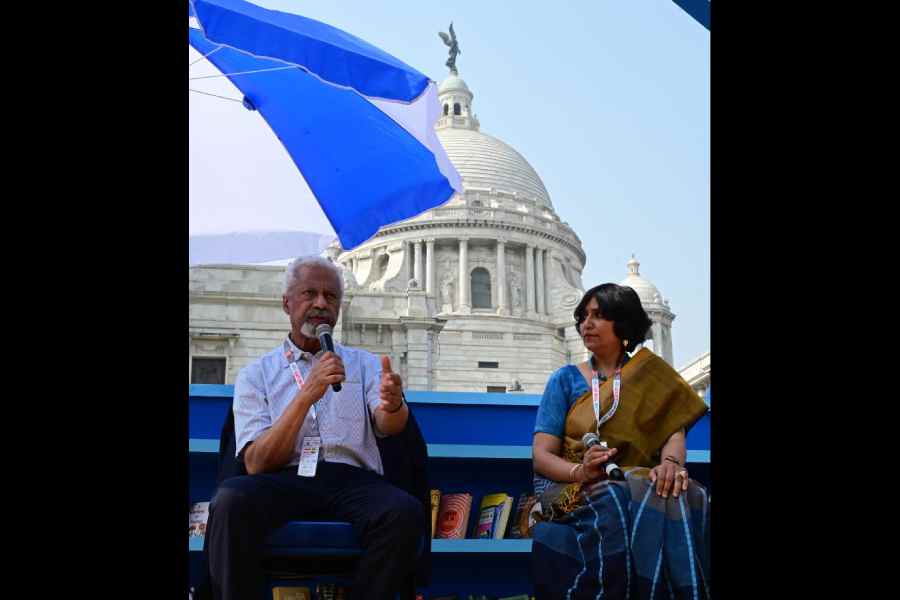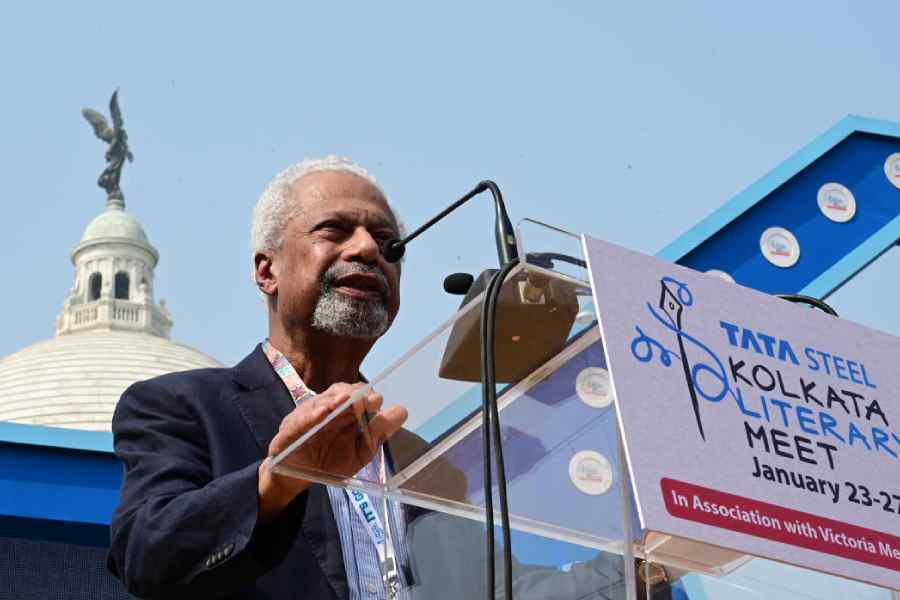Watching Abdulrazak Gurnah preside over the inauguration of Tata Steel Kolkata Literary Meet, in association with Victoria Memorial Hall and in partnership with The Telegraph, felt like the collective manifestation of Calcuttans to have the Nobel laureate in the city fructified. Tanzanian-born Gurnah, who began writing as a 21-year-old in English exile with the theme of the refugee’s disruption, has been a regular face at the Jaipur Literature Festival and to watch him kick off the five-day literary festival at Victoria Memorial Hall and then address a packed shamiana was a literary enthusiast’s delight.
His session, the first on Kalam’s calendar, ‘A Life in Writing’ in conversation with Nilanjana S Roy, kicked off with what reading meant to him and how it started to take him towards writing. “It wasn’t like a mission about reading. It’s something that gave me pleasure but the scarcity of books contributed to a kind of hunger in me. I was reading the same book again and again. I would read my school textbook multiple times as there was nothing else to read. One of the interesting things about going to England was how much there was available in contrast to what I described about growing up. I think that was the beginning of understanding something like literature, not writing it but literature could be something I might want to turn into a career or devote myself to. I think that discovery of so much reading excited me.”
Gurnah’s literary journey wasn’t a smooth one as his first book, Memory of Departure, took more than a decade to get published. He informed an eager audience about the multiple rejections he had to face, the tedious process of getting clearance from a publication house, and how he learned a great deal from all these experiences. Throwing more light on migrating to England at a time when the literary world was openly racist and pro-Empire, the emeritus professor of English and Postcolonial Literatures at the University of Kent, said: “It was a difficult experience at that age to leave everybody, to leave country and family and to go to England. It is difficult for anyone who is a complete stranger to another place and then there was the associated histories of hostilities that made it difficult for England to be open for people like me. The other thing is when I look at and listen to people who relocated or who migrated I think about what they have left behind. I think that’s how writing started for me, to try and make sense of that.”
Gurnah, whose work includes Admiring Silence, By The Sea, The Last Gift, Desertion, Gravel Heart and Afterlives among others, received the Nobel Prize in 2021. He pointed out how colonialism is not over yet and how colonial powers still in some ways or the other have a presence in many countries.
Moving on, on a lighter note, Gurnah shared why a full-length novel appeals to him more than a short story. “The novel has so much in it; you can make it as complex as you want. I have no problem with short stories, I have written a few, but if I start independently to write a short story it doesn’t remain short. I have read a few great short stories and they are satisfying in some sense but… I am also not a good reader because I am like then what happened? How did the character reach here, and all these questions.”
Before fielding questions from the audience and advising them to not give up writing if they want to become a writer in future, he shared the news of his upcoming book — A Long Journey, that sent a wave of excitement among his fans in the audience.
Post his session, Abdulrazak Gurnah engaged in an exclusive chat with t2. Excerpts..
What was your perception about Calcutta and how does it feel to be here?
It’s nice to be here. I’ve heard a lot about Calcutta and I arrived here just yesterday. I am yet to explore the city. It’s nice to actually be here for a literary meet.
Last year when we met you at the Jaipur Literature Festival you said how you were not getting time after winning the Nobel Prize to sit down and write a new story. And you just gave good news about your new book. How did you manage to work on the book?
That was probably in January last year and then I have managed to make some time throughout the summer. From March till August and September, I didn’t go anywhere or didn’t do anything much and that’s how I completed the novel.
When can we expect it to be out?
It will come out sometime in Spring 2025.
You mentioned the hostilities that existed when you started writing in England. Times have changed but hostile means like censorship, the culture of banning books still exists and even persecution of writers prevails. Has it affected you and your craft?
Nothing of mine has ever been banned anyway that I know of but obviously, it is an unfortunate thing, a terrible thing if it does happen to people and they are forced to either ban or even censor themselves.

Gurnah signed the canvas at the inauguration.
Pabitra Das.How big do you think it is the responsibility of authors and writers to express themselves or say things the way they are, without fear?
It’s always the responsibility of the author to say what he or she thinks is important. It’s the writer’s responsibility to write truthfully about whatever it is they want to write about.
From your first book to now and the next book that you have written, have things changed in the world? Are we moving towards a better and peaceful tomorrow or have the extremist forces become stronger?
I don’t know about that. I don’t know about the world. It does seem that way, but I don’t know if that’s because there is greater violence or because we are now able to hear about it more. I suppose there is greater violence, yes, but that’s also to do with various, what looks like stable institutions like the Soviet Union or many other places have become unstable. I don’t really know whether it’s a perception or whether it’s real or the world has become smaller because of the way the coverage of events in the world has become more intense. Anyway, I don’t know about that, I write books.
All these things don’t affect your writing?
Of course, they do. I live in the world and everything affects me but some things affect me more because they are nearer to my experience but you know you can’t write about everything. You can only write about the things that you have knowledge of for a start and also you feel strongly about.

Gurnah at the session 'A Life in Writing', in conversation with Nilanjana S Roy.
Pabitra Das.When you see violence, displacement, the refugee crisis now what do you feel?
I feel it is an unjust event that is taking place and we are a strong prosperous society and can assist those who are in need than just perhaps obligation to do something.






